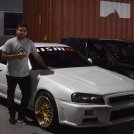Important Vs Non Important Gauges
Announcements
-
Similar Content
-
Latest Posts
-
By TurboTapin · Posted
Perfect, I'll get to it this winter then at the same time as I weld on my anti squat kit. -
By SeanR32GtSt · Posted
Alright so my 32 only has one temperature no matter what degree you set it to. I’ve tried disconnecting the servo motor arm and moving it either direction and got no change. I’ve fixed the leak in my AC and re charged it and with it on and clutch engaged it still blows hot even though the low pressure pipe going to the firewall is ice cold. Both heater core hoses are hot while running as well. Diagnostic code showed 24 for intake air temperature sensor. Anybody got any ideas? -
I said Garrett style. Not Garrett genuine. And something in the G30 550 range is what you want. Not those pokey little old fashioned T28 sized things. The intake ports in the head are small. There is little benefit in fattening up the runners and leaving ths actual ports small. Just run what you've got. And on the subject of Nistune vs Haltech etc..... You know you can control the transmission with decent standalone ECUs these days, right? No need to keep any of that old Nissan bullshit. Don't get me wrong - I use Nistune on my Neo. But it is a DET, so the number of bodges and workarounds I had to do to make it work in a chassis without ABS, TCS, etc, is quite small compared to the herniated arsehole you will have trying to make it work on a motor that doesn't have some of the things that the turbo ECU wants to see. Just easier to bite the bullet and go aftermarket outright.
-
Hmm. Only when the f**king thing is actually working. Still can't find the leak. And that's with dye being put in the last 3 times!
-





Recommended Posts
Create an account or sign in to comment
You need to be a member in order to leave a comment
Create an account
Sign up for a new account in our community. It's easy!
Register a new accountSign in
Already have an account? Sign in here.
Sign In Now